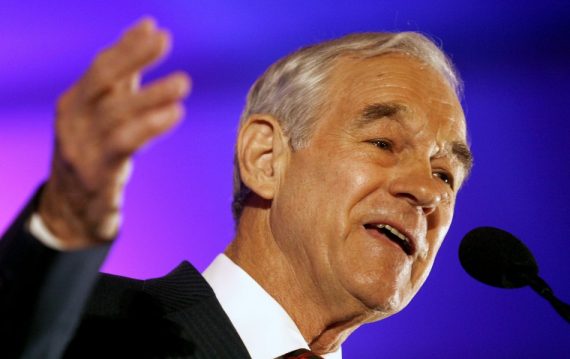Would A Ron Paul Win Kill The Iowa Caucuses?
Iowa Republicans fear that a Ron Paul win on Jan. 3rd will destroy the credibility of their caucuses.
Iowans are apparently worried that a Ron Paul victory in two weeks could strike a fatal blow against the credibility of the Iowa Caucuses themselves:
SIOUX CITY, IOWA -The alarms are sounding in Iowa.
Conservatives and Republican elites in the state are divided over who to support for the GOP nomination, but they almost uniformly express concern over the prospect that Ron Paul and his army of activist supporters may capture the state’s 2012 nominating contest — an outcome many fear would do irreparable harm to the future role of the first-in-the-nation caucuses.
In spin rooms, bar rooms and online forums, the what-to-do-about-Paul conversation has become pervasive as polls show him at or near the top here just weeks before the January 3rd vote.
Paul poses an existential threat to the state’s cherished kick-off status, say these Republicans, because he has little chance to win the GOP nomination and would offer the best evidence yet that the caucuses reward candidates who are unrepresentative of the broader party.
“It would make the caucuses mostly irrelevant if not entirely irrelevant,” said Becky Beach, a longtime Iowa Republican who helped Presidents Bush 41 and Bush 43 here. “It would have a very damaging effect because I don’t think he could be elected president and both Iowa and national Republicans wouldn’t think he represents the will of voters.”
What especially worries Iowa Republican regulars is the possibility that Paul could win here on January 3rd with the help of Democrats and independents who change their registration to support the libertarian-leaning Texas congressman but then don’t support the GOP nominee next November.
“I don’t think any candidate perverting the process in that fashion helps [the caucuses] in any way,” said Iowa House Speaker Kraig Paulsen, adding that he didn’t know if that’s necessarily how Paul would win.
While there’s no evidence of an organized effort, public polling shows that Paul’s lead is built in large part with the support of non-Republicans – and few party veterans think such voters would stick with the GOP in November.
“They’ll all go back and vote for Obama,” predicted Beach.
The most troubling eventuality that Iowa Republicans are bracing for is that Paul wins the caucuses only to lose the nomination and run as a third-party candidate in November — all but ensuring President Obama is re-elected.
“If we empower somebody who turns around and elects Obama, then that’s a major problem for the caucuses,” said Rep. Steve King (R-Iowa).
Leading Republicans, looking to put the best possible frame on a Paul victory, are already testing out a message for what they’ll say if the 76-year-old Texas congressman is triumphant.
The short version: Ignore him.
We’ve actually already started to see an effort to do this from some on the right. Fox News’s Chris Wallace isn’t generally ideological, however he did say last week that a Paul win in Iowa would make them entirely irrelevant to this year’s Republican race. Not surprisingly, this has caused some push-back among those sympathetic to Paul. Andrew Sullivan, for example, has pointed out several times this week that these are the same Iowa where Pat Robertson came in a surprisingly strong second in 1988 and they managed to survive quite nicely after that. This is a fair point, of course. In many ways, Pat Robertson was more of an extremist candidate in 1988 than Ron Paul is today. However, it’s worth remembering that, after 1988 the Dole and Bush 41 campaigns did their best to marginalize him as the campaign headed into New Hampshire and Super Tuesday and it worked. In New Hampshire, Robertson got only 9% of the vote and, after that he was only able to capitalize on support in caucus states like Alaska, much like Ron Paul himself did in 2008.
David Weigel sketches out what would happen if Paul wins Iowa, and it sounds very similar to 1988:
Paul is in a curious place—a three-time presidential candidate who has barely been vetted by the media. He’s been the GOP’s proudest anti-war, anti-torture voice for four years. That position has earned him soft interviews with Jay Leno, and countless segments on The Daily Show.
If Paul wins Iowa, that stops. The conservative press, which has been bored but hostile to Paul all year (just see the National Review‘s cover story), will remind its readers that Paul wants to legalize prostitution and narcotics, end aid to Israel (as part of a general no-aid-for-anyone policy), and end unconstitutional programs like Medicare and social security. The liberal press will discover that he’s a John Birch Society supporter who for years published lucrative newsletters studded with racist gunk. In 2008, when the media didn’t take him seriously, Paul was able to get past the newsletter story with a soft-gummed Wolf Blitzer interview. (“Certainly didn’t sound like the Ron Paul that I’ve come to know and our viewers have come to know all this time,” said Blitzer.) This was when Paul was on track to lose every primary. It’ll be different if the man wins IAllowa.
Or, as I put it earlier this week, Ron Paul’s past will catch up with him.
But that’s Ron Paul, what about the caucuses themselves? Would a Ron Paul victory in two weeks be a fatal, or even near fatal, blow to the credibility of the Iowa Caucuses such that we might actually see other states challenge the Hawkeye State for first-in-the-nation supremacy in four or eight years? Allahpundit says yes:
A Paul win presents a particular issue for Iowa. They fought this year to keep their prized position in the primaries, and the RNC went to bat for them to keep it. If the caucuses end up producing Ron Paul — the publisher of a newsletter that for years featured racist statements and lunatic conspiracy theories — as their preferred candidate, it will spell the end of the line for Iowa as the first testing ground of Republican presidential hopefuls. It will also likely rally the GOP around Mitt Romney as the nominee, being the safest choice and the easiest to rally around in defense of a Paul nomination, especially with Gingrich unable to close the deal in Iowa after bouncing so high up in the polls.
As does Steve Benen:
Iowa, for reasons I’ve never been fully comfortable with, believes it is blessed by God to have first-in-the-nation status, and fiercely treasures this role. Candidates, or even possible candidates, have been reluctant to even suggest changes to the existing structure.
But a Paul victory would set a precedent that could change how Republicans perceive the caucuses themselves. It wouldn’t necessarily lead to a de jure change, but rather a de facto change — GOP presidential contenders would simply conclude, “Let’s focus our attention on New Hampshire on South Carolina, because those Iowans appear to be nuts.”
,
A party county chair in Iowa told Politico, “My biggest fear is that the Republican Party nationally and a lot of states that want to be number one [in the nominating process] will simply point to his winning and say, ‘Iowa’s irrelevant.'”And that seems pretty likely.
Quite honestly, if a Ron Paul victory ends up being the hammer that finally drives a wooden stake through the heart of the absurd idea that Iowa should be the state that goes first in our Presidential selection process, I would not be disappointed at all. Iowa is not representative of the country at all, either demographically or ideologically, and even its Republican selectorate is out-of-step with Republicans nationally. Moreover, caucuses are hardly the most representative manner in which to choose a candidate. They’re better than Party Conventions, where a few thousand people can end up tossing a a popular incumbent (Exhibit A: Robert Bennett in Utah in 2010), but they’re far less of a reflection of what the voters of Iowa believe than an actual primary would be. For example, there were 1,537,123 votes cast in Iowa in the 2008 General Election. In the Republican Caucus, there were 119,188 participants. The Iowa Democratic Party does not release raw vote totals for its caucus, but I think we can be certain that there likely at most 200,000 participants, perhaps more perhaps less. In other words, the “winners” out of Iowa last time around were selected by something approaching 20% of the electorate that voted the following November. That’s why it’s so easy for candidates like Huckabee, Pat Robertson, or Ron Paul to pull off strong showings there. If Iowa were a primary, it’s unlikely Paul would be polling nearly as well as he is right now. So, diminishing the importance of an event that gets far more attention than it deserves may actually be Ron Paul’s greatest contribution to American politics.
If only I believed that it actually could happen.
If the Iowa Caucuses can survive Pat Robertson, the “Dean Scream,” and Mike Huckabee, they’ll survive Ron Paul. The New Hampshire Primaries were in a similar situation after Pat Buchanan’s surprisingly strong second place showing in 1992, and his victory, albeit by a single percentage point, in 1996, and they’ve survived just fine. As I’ve noted before, it seems pretty clear to me that Ron Paul would have a very difficult time capitalizing on an Iowa victory very far beyond New Hampshire. He is in single digits in the polls in both South Carolina and Florida and, notwithstanding his seemingly endless fundraising abilities, it’s going to be difficult for him to compete against candidates like Romney as we get deeper into the primaries. Moreover, as the number of states with closed primaries increases, Paul will be unable to capitalize on his biggest strength, his ability to attract support from younger independent voters who either have not voted in the past, or may have voted for Barack Obama in 2008. Much like other Iowa winners in the past, then, Paul will fade in importance, although his victory in Iowa would probably be the best thing that could possibly happen to Mitt Romney at this stage of the race.
So, no, a Ron Paul win will not kill the Iowa Caucuses. It would be nice if it did, though.







A more important question: after the way both Paul and Johnson have been treated in the primary process, does the GOP expect any libertarian leaning voters to still vote Republican?
I’m not a fan of Iowa’s influence over primary ballors, but “Iowa is not representative of the country at all, either demographically or ideologically” is not correct.
Iowa votes in the last 3 Presidential elections are:
2008 Obama 54-44
2004 Bush 50-49
2000 Gore 48.5 -48.2
Looks pretty close to right on the national averages each time.
Well of course the GOP does…the Republicans probably think that libertarians have nowhere else to go without simply throwing away their votes…
I wouldn’t defend Iowa’s first-in-the-nation status, but let’s just be sure and include New Hampshire in the criticism. At least Doug points out Buchanan’s win there in 1996, but many pundits seems to have an East Coast bias that treats small, lilly white and politically idiosyncratic New Hampshire differently than it regards small, lilly white and politically idiosyncratic Iowa.
Mike
Iowa Republicans have picked the ultimate nominee in two of the last five contests; I don’t think Paul changes anything.
The primary purpose of the Iowa caucus is to give lesser-known candidates a forum from which to launch a national campaign. The caucus will be more important to Bachman and Santorum than Romney.
@PD Shaw:
2008 — Huckabee wins Iowa, McCain wins the nomination, loses General Election
2000 — Bush wins Iowa and the nomination, wins General Election
1996 — Dole wins Iowa and the nomination, loses General Election
1988 — Dole wins Iowa, GHWB wins the nomination and the Presidency
1980 — GHWB wins Iowa, Reagan wins the nomination and the Presidency
That’s not a very good track record, IMO. In Dole’s case in particular, his 1996 was virtually a foregone conclusion due both to his 88 win and the fact that he represented nearby Kansas in the Senate and was quite popular in Iowa.
@Doug Mataconis: “That’s not a very good track record, IMO.”
And New Hampshire picking Hillary in ’08, McCain in ’00, Buchanan in ’96, Tsongas in ’92, Hart in ’84, Muskie in ’72 and Henry Cabot Lodge in ’64?
Mike
@MBunge:
On the Republican side at least, the South Carolina primary has been a better predictor.
As i’ve said before, though, my preference is for a system of regional primaries. Divide the nation up into four groups. Two of those will have 12 states, two will have 13 states. One regional primary per month starting in February, with the order of which region goes first being rotated every 4 years.
Alternatively, you could divide the nation into smaller regions, say 5 so then you’d have an even ten states per region.
Now see here, Ron Paul says all those lunatic, racist, and conspiracy comments were in a newsletter he owned/sponsored/whatever, were just musings of the staff or other writers……he had no part in them, and besides they were a long time ago and he has changed his mind about that which he did not ever write. His support of the John Birch Society was just youthful indiscretion. He says he is the only true Sates Rights, strict Constitutional candidate….except for the constitutional things he will change….and some minor national governmental laws he likes.
Now that he is an elder Statesman with genuine good ideas and proven leadership on a couple of issues, forget about all that other stuff from that bygone era.
Ah, let Iowa continue to do what it wants. I really hope Ron Paul wins there and in New Hampshire, if only to hear the screams of agony from the standard Republican flag-bearers.
“On the Republican side at least, the South Carolina primary has been a better predictor.”
Because South Carolina is a perfect example of the ideological median of the country. As the old joke went, it was voted the state Most Likely to Secede.
@Stormy Dragon: well, they certainly won’t have many conservatives voting with them, given the way conservative candidates are being treated.
And , I won’t speak to Johnson, not having paid much attention to him, but as to Paul, I said when he entered the GOP, that I doubted he’d bring many libertarians with him… mostly because most libertarians don’t see Paul as a serious libertarian.
The way you distort Paul’s policies shows me you’re not too far outsidethebeltway.